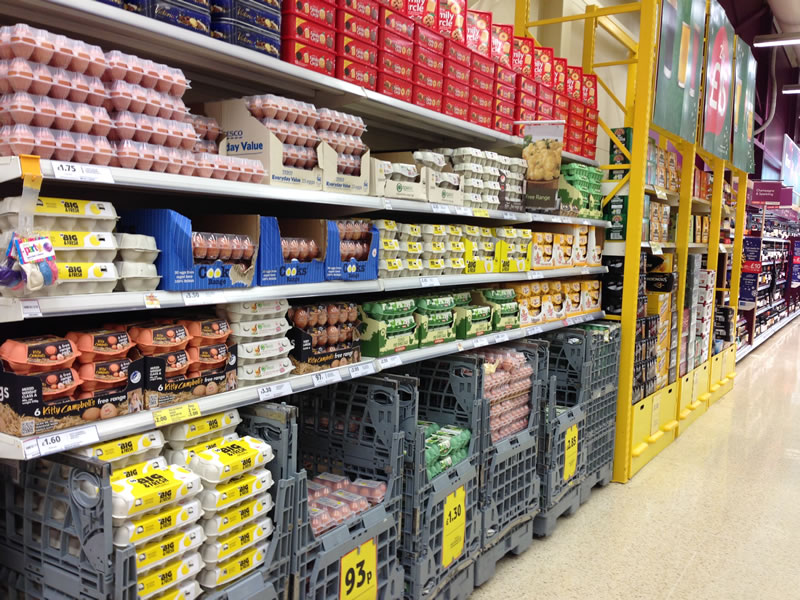
Remarkable statistics suggest that consumers may have been put off buying eggs because they could not find what they wanted in a shop.
Nearly 60 per cent of consumers who took part in recent a survey said they had gone shopping with the intention of buying eggs but had not done so because the store did not have the type, size or pack size of eggs they wanted or the retailer had sold out of eggs completely. Only three per cent of those questioned said they did not need eggs.
The results of the survey were outlined at the International Egg Commission (IEC) conference in Cape Town, South Africa, and come at a time when the egg industry in the United Kingdom and elsewhere has been looking to increase the consumption of eggs to expand the market for egg producers. The statistics, which were produced by Carsten Sandau, a marketing expert who works within the egg industry, suggest that the industry could be missing out on existing sales by turning people away.
Carsten Sandau commissioned a study of the egg sector in five countries - the United Kingdom, France, Germany, Italy and the United States. In each of the four European Countries and in two states in America - California and Pennsylvania - 1,000 people were asked a series of questions relating to their egg buying behaviour. In one section of the questionnaire consumers were asked about not buying eggs when they had planned to do so when they set off shopping.
Some 28 per cent said they had not bought them because they were too expensive, but 59 per cent said that the store had sold out or it did not have the eggs they wanted. In 21 per cent of cases the retailer had sold out, 22 per cent said they had not bought because the store did not have the free range or organic eggs they wanted, 15 per cent said the retailer did not have the pack size they wanted and 14 per cent said they could not obtain the size of eggs they wanted. Some 18 per cent said they didn't buy because the packaging was damaged and 12 per cent said they had simply forgotten to buy eggs.
In another section of the questionnaire shoppers were asked about times that they had bought eggs although they had not planned to do so, and as many as 86 per cent reported taking eggs home as an impulse buy. Some 66 per cent off respondents said they remembered when they got to the egg display that they needed them, 18 per cent said that when they saw the eggs they thought of how they could use them, 17 per cent said they had bought them on seeing a special offer in store, 11 per cent said they were inspired by a recipe they saw in store and eight per cent said they had been inspired by another product they had seen or bought in store.
Carsten Sandau said that the survey results indicated that there was a huge opportunity for the egg industry to influence what consumers bought once they were in the store, with nearly 90 per cent of shoppers admitting to impulse purchases of eggs and 60 per cent of consumers having left a store without eggs although they had gone there with the intention of buying some.
Carsten Sandau's presentation took place during a marketing session at the IEC's South African conference. Delegates who attended the session also heard from Masanda Peter, who shared her experiences of how to create a big impact on a small budget.
She said that 23 years ago the South African Poultry Association created the Galliova Awards, which were presented to the very best South African food journalists in recognition of outstanding work: the quality of their writing, the presentation of their articles, the information made available to their readers. She said they were highly prestigious awards, with the winners gaining great acclaim within their industry. The awards were sponsored by South Africa’s egg producers and the publicity they received, she said, was worth 12 times the value of their investment.
She said that the Galliova Awards had enabled egg producers and food journalists to forge strong working relationships and a mutual love of eggs. Pier Passerini, an egg producer in South Africa, told the IEC delegates that the Galliova Awards provided South Africa’s egg producers with access to the top food writers in the country’s leading magazines.
The Cape Town conference was attended by 400 delegates representing the egg industry from all over the world. Joanne Ivy, chairman of the IEC, said when she officially opened the conference, “The IEC’s role is to represent organisations across all parts of the egg industry internationally and help to maximise business opportunities. This IEC Cape Town conference agenda has been designed to really get to the heart of the issues that you, our members, are facing.”
The International Egg Commission stages its conferences twice each year. The next one will be held in Vienna, Austria from March 30 until April 1 in 2014.
